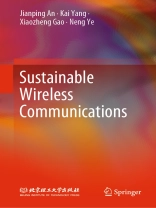This book discusses the architecture of future wireless networks, reliable communications between different nodes, and energy-efficient resource allocations for achieving sustainable wireless communications. To meet the increasing demands of wireless communication networks and achieve sustainable wireless communications, various promising technologies in this book have been investigated and developed. This book is to present cutting-edge research results on achieving sustainable wireless communications.
In particular, the sustainable ultra-dense heterogeneous networks and the sustainability issues of non-orthogonal multiple access are investigated, the performances of cooperative networks with space-time network coding under different scenarios are evaluated, the dynamic estimation for a unified laser telemetry, tracking, and command system is discussed, and the energy-efficient resource allocation schemes are developed for future wireless communication networks. Webelieve that the results in this book can provide useful insights for the design of future wireless communication networks and achieving sustainable wireless communications. Graduate students, researchers, and engineers in the field of wireless communications can benefit from the book.
Tabla de materias
Introduction.- Sustainable Ultra-Dense Heterogeneous Networks.- Non-Orthogonal Multiple Access: Achieving Sustainable Future Radio Access.- Space-Time Network Coding with TAS.- Space-Time Network Coding with Antenna Selection.- Compressive Sensing Based Dynamic Estimation .- Energy-Efficient Power Control for D2D Communications.- Energy-Efficient Resource Allocation in Heterogeneous OFDMA Networks.- Energy-Efficient User Scheduling and Power Control for Multi-Cell OFDMA Networks based on CDI.- Energy-Efficient Base Station Association and Beamforming for Multi-Cell Multiuser Systems.- Summary.
Sobre el autor
Jianping An received his Ph.D. degree from Beijing Institute of Technology, China, in 1996. He is currently Full Professor and Dean of the School of Cyberspace Science and Technology, Beijing Institute of Technology. His research interests are in the field of digital signal processing, cognitive radio, wireless networks, and high-dynamic broadband wireless transmission technology.
Kai Yang received the Ph.D. degree from Beijing Institute of Technology, China, in 2010. From January 2010 to July 2010, he was with the Department of Electronic and Information Engineering, Hong Kong Polytechnic University. From 2010 to 2013, he was with Alcatel-Lucent Shanghai Bell, Shanghai, China. In 2013, he joined the Laboratoire de Recherche en Informatique, University Paris Sud 11, Orsay, France. Now, he is Full Professor in the School of Information and Electronics, Beijing Institute of Technology, Beijing, China. His current research interests include convex optimization, massive MIMO, mm Wave systems, resource allocation, and interference mitigation.
Xiaozheng Gao received the B.S. degree and the Ph.D. degree from Beijing Institute of Technology, Beijing, China, in 2014 and 2020, respectively. He was Visiting Student with the School of Computer Science and Engineering, Nanyang Technological University, Singapore. He is currently Postdoc at the Beijing Institute of Technology. His current research interests include cellular communications, backscatter communications, and energy harvesting.
Neng Ye received his B.E. and Ph.D. degrees from Beijing Institute of Technology, China, in 2015 and 2021, respectively. He was 5G/B5G research intern with the Wireless Technology Department, DOCOMO Beijing Laboratories, from 2015 to 2020. He is currently Assistant Professor with the School of Cyberspace Science and Technology, Beijing Institute of Technology. He is Young Editor of the Journal of Electronics & Information Technology. In his work, he focuses onboth research and standardization of next generation radio access. His research interests include multi-user information theory, non-orthogonal multiple access, waveform, cell-free MIMO, and deep learning.












